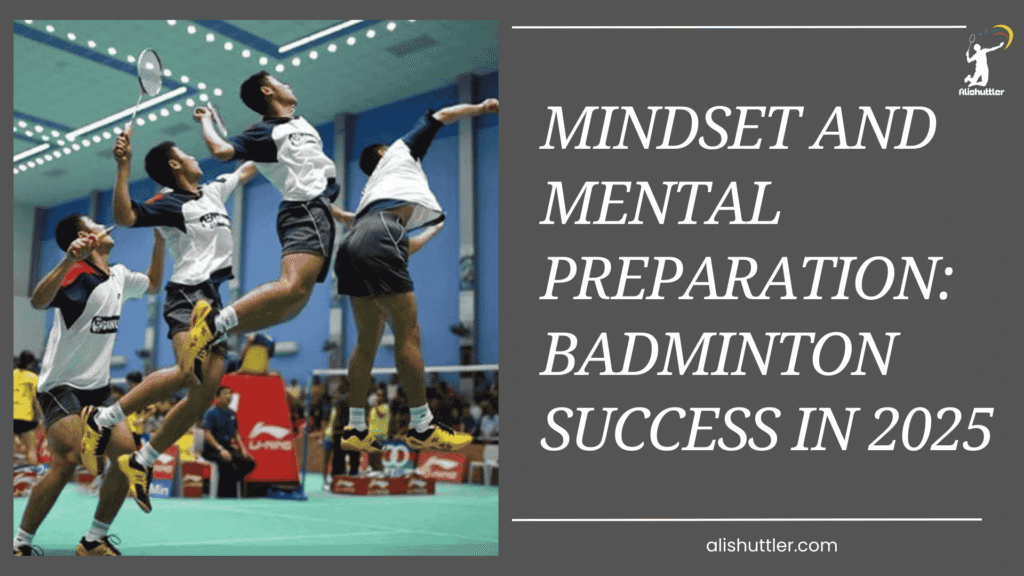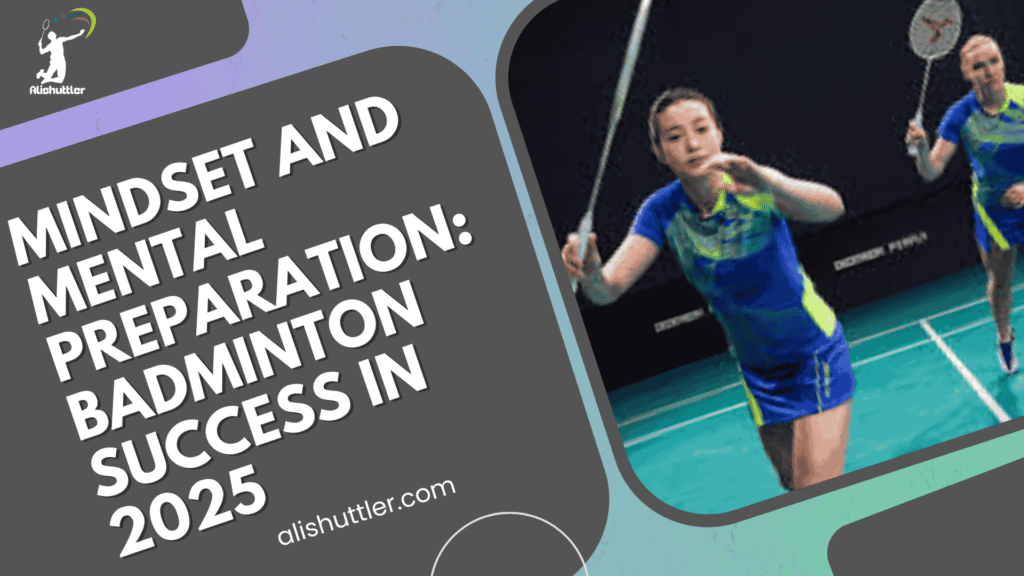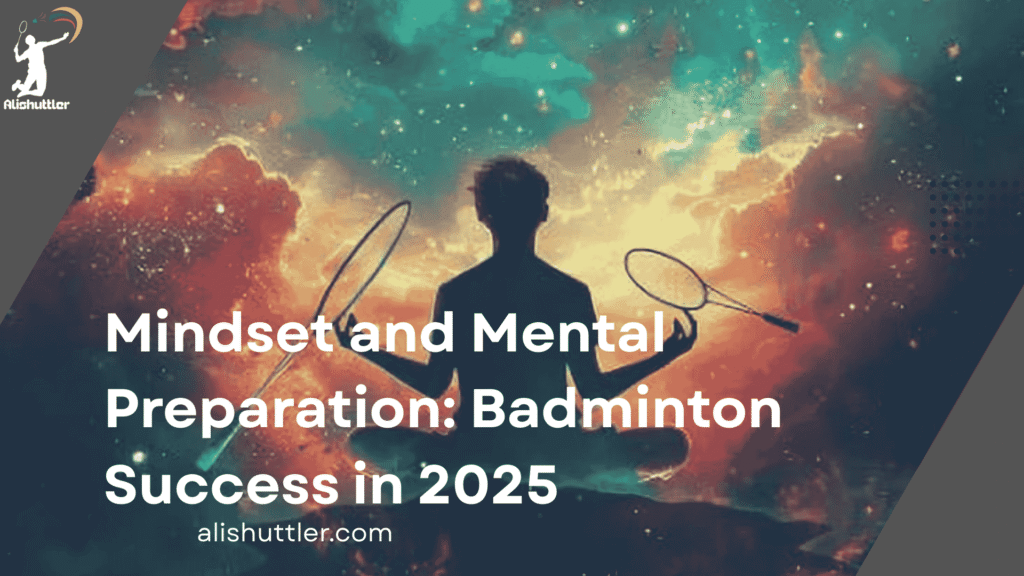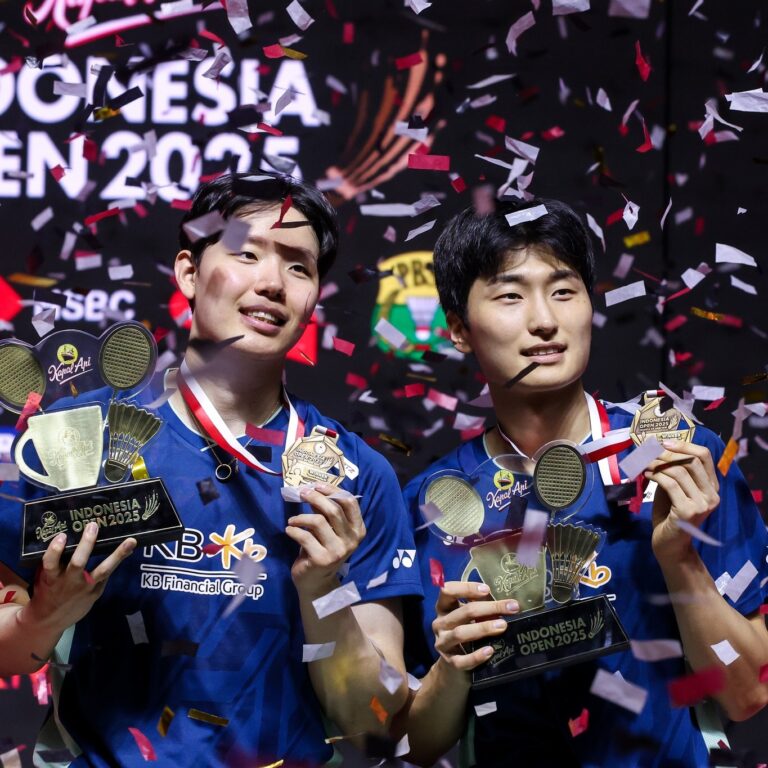A good Mindset and Mental Preparation in badminton refers to how players prepare their minds and emotions to deal with each match. A good mindset allows players to keep cool, make rapid decisions, and recover from errors.
Mental skills such as focus and self-talk assist in coping with pressure and maintaining high-level play. Best employ routines and mental drills to stay sharp.
The meat is in the main body, which explains how to develop these habits and their importance for all players.
The Badminton Brain
Badminton is not only a swift sport, it’s a cognitive exercise. Mental preparation and mindset carve a player’s triumph on the court, often just as much as ability or force. Although equipment and technique get the most attention, it’s the invisible work of the mind that is equally important and can be the difference in a tight match.

Neural Pathways
Each time a player reiterates a clear or smash, the motor pathways in the brain become more robust. Muscle memory is constructed by this sort of repetition. It’s not about moving quicker, but about moving wiser.
The more a player practices, the more their brain wires itself to those actions, making every shot more automatic and less error prone. When you’re learning new techniques, such as a backhand net shot or flick serve, your brain needs to adjust.
This process makes the mind malleable. This habit of attempt and repetition with a new skill keeps the brain stimulated and forming new connections, which enhances general brain functioning.
Cognitive Boost
Badminton supercharges memory by having players memorize scores, plays and formations. Fast rallies condition the brain to think quickly and remember what worked in previous points. Reaction time gets better too since players have to identify the shuttle’s trajectory and reposition in an instant.
The mental side of the game is a workout as well. Figuring out an opponent’s next move, or when to switch from defense to offence, develops a player’s problem-solving skills.
It’s this type of thinking that keeps the brain sharp, not just on the court but off it as well. Badminton is replete with split second decisions. Players who maintain a cool head and remain committed to their strategy tend to make smarter decisions, even during high-pressure situations.
Visualization, in which players imagine themselves executing a winning shot, is a mental instrument that assists with this composure.
Stress Reduction
Badminton is a great way to blow off some steam. Exercise releases endorphins, which can boost mood and reduce stress. Playing with friends or at a club introduces a social element that allows players to unwind and have fun.
Mindfulness is connectable to each rally. Concentrating on the noise of the shuttle or the texture of the grip keeps players in the moment and reduces jitters. Most of them swear by meditating and breathing before a match to clear the mind and focus.
Mindset and Emotions
Mindset is difficult to quantify but omnipresent. Thoughts like these sting the performance — with practice players can turn these into positive self-talk. The mind-body connection is powerful—easy exercises such as juggling can assist with concentration and cerebral equilibrium.
| Cognitive Benefits | Emotional Impacts |
|---|---|
| Improves memory | Reduces stress |
| Sharper decision-making | Boosts mood |
| Faster reaction time | Fosters enjoyment |
| Better focus | Lowers anxiety |
Sharpen Your Mind
Badminton’s mental training determines how players manage stress, maintain focus, and respond under pressure. Make mental training a part of your routine, not tacked on, but as an integral element of growth. Treat mental workouts with the same attention you give to physical training. This results in an equilibrium, primed mind state that keeps you razor sharp on the court.
1. Visualization
Imagine yourself sinking the game-winning basket or covering a hard-hitting rally. Imagery like this accumulates faith before you even step on court. Athletes who use visualization tend to feel more confident in their abilities and less nervous before competitions.
Imagine yourself in various match situations. Picture a talented adversary, a missed attempt, a comeback. Walk through it all—how you shuffle, inhale, respond. This assists your mind associate goals with rewarding consequences, rendering you prone to replay them in reality.
Visualization is not a substitute for practice, but it gives you a mental advantage by priming you for adversity and enhancing your strategic thinking.
2. Meditation
Meditation teaches you to maintain attention and reject distraction, something all the more important during extended rallies or cacophonous tournaments. Mindfulness meditation, where you observe your thoughts non-judgmentally, helps you tame emotions such as frustration or jitters. This comes in handy when a bad call or lost point attempts to derail you.
Simple breathing exercises—like closing your eyes and taking a deep breath and slow exhale—will calm you and clear your mind. Only a few minutes a day, and you’ll remain calm and composed when it really counts.
3. Self-Talk
Learn to identify and transform those negative thoughts. Good self-talk, such as, “I’m prepared for this,” can assist in preventing your mind from going into a spiral during hard games. It’s more than just sunny — it’s directing your mind toward growth and grit.
Use brief declarations to construct and maintain your self-assurance. ‘I have trained hard’ or ‘I recover fast’ can help keep doubts in check. Trace your self talk and keep it on target to your objective.
4. Routine
Establish a consistent pre-match routine. That might be stretching, music, or going through the same warm-up steps every time. Regular rituals assist in cueing your mind and body that it’s time to play.
Feel free to modify your routine to suit you. The trick is to establish habits that put you in the zone and ready to roll. Small, easy-to-use cues—like bouncing the shuttle or tying your shoes in a special way—can help get your mind in the right place.
A good routine lowers nerves.
5. Kinesiology
Kinesiology, or movement science, lets you visualize the ways in which body and mind connect in badminton. By being aware of how your body moves, you’ll stay cognitively sharp and able to identify stress points before they become problematic.
Concentrate on slick footwork or grip changes to keep you in the moment. These tiny victories will fire up your confidence and help you stay cool-headed under pressure.
The way you move molds your mind. Robust, harmonic swingings can keep your mind free and focused.
Master Your Focus
Great focus is the foundation of any badminton player looking to level up. Whether you’re training or competing in a tournament, managing distraction and remaining tuned in can make a world of difference. Habits as simple as spending time in quiet reflection, meditation, deep breathing, and positive self-talk construct mental resilience.
These steps apply to all players, regardless of where they live or play.
Pre-Match Rituals
Pre-match personal rituals help set a calm, ready mindset. A ritual might be as basic as stretching, reciting a mantra, or shutting your eyes to visualize the court. These habits reduce pre-game jitters and provide a feeling of control.
A helpful pre-match checklist might include: arrive early and check racquet tension, warm up with light jogging, do three rounds of slow, deep breaths, repeat a short phrase like “steady and sharp,” and spend one minute visualizing key shots. Every step is intentional.
Getting there early reduces last-minute stress. Warming up prepares the body. Breathing calms the nerves. The more you repeat an affirmation, the more it builds a can-do mindset. Visualizing these key shots hones your focus on the upcoming task.
These steps collectively build a mind shield from external distractions and allow you to stay in the flow for Mindset and Mental Preparation in badminton.
In-Game Cues
Players employ cues during games to maintain focus and adhere to their strategies. A cue might be a word such as ‘balance’ or a small physical action such as tapping the racquet. These cues prompt players to adjust their stance, breathe or reset their thinking.
Easy sayings like “watch the shuttle” or “move your feet” can bring focus back during hard rallies. Other players nod their head or tap their foot after each point to keep themselves grounded in their strategy for Mindset and Mental Preparation in badminton.
These habits become anchors, maintaining concentration even when the bout gets tight. Knowing when to employ a cue is important. If focus slips after an error, a planned cue can help bring you back.

Training with cues during practice ingrains the habit, so it seems natural during real matches Mindset and Mental Preparation in badminton.
Post-Point Reset Mindset and Mental Preparation in badminton
Following every rally, a reset routine assists players in clearing their mind and getting ready for the upcoming point. This could be as simple as inhaling slowly or strolling to the edge of the court.
Deep breaths breath in and out softly ten times calm the nerves and increase concentration. A brief visualization say, imagining a perfect clean stroke can assist players to reset. Simple habits between rallies towel off, bounce on toes return your Mindset and Mental Preparation in badminton to the now.
These resets, if frequent, help keep stress in check, frustration in control, and emotion in check.
The Dual Mindset
Mindset and Mental Preparation in badminton requires a quick mind as much as quick feet. Each match comes with its own mind baggage, shaped by singles or doubles play. Having a dual mindset means having two mindsets simultaneously. In this sport, it might sound like strategizing to mimic a top player i.e., “I’ll play this like Lee Chong Wei” but then failing to deliver in the middle of a tense rally.
Sometimes players receive coaching advice that conflicts with their instinct, like bobbing your head “okay, coach” but scheming to attempt a Lin Dan trick. This push and pull can introduce fresh options yet cause momentary paralysis. Feelings, remembrance, and previous alignments will all influence players’ mentality and behavior, even if it doesn’t add up.
| Singles Mentality | Doubles Mentality | |
|---|---|---|
| Focus | Self-reliance | Shared responsibility |
| Motivation | Internal, self-driven | Team-based, partner-driven |
| Decision-Making | Fast, individual | Coordinated, joint |
| Accountability | Personal | Split between partners |
| Communication | Minimal | Essential |
| Emotional Control | Solitary | Shared, supportive |
Singles Mentality Mindset and Mental Preparation in badminton
Singles players are out there by themselves on court. They require a spirit fueled by self-sufficiency and determination. After all, it all begins and ends with a single individual. When the going gets hard, there’s no one to fall back on.
It’s hard not to fall into isolation, particularly following a series of mis-steps. Winning singles players construct habit and motivation by imposing their own objectives such as taking a defined number of smashes per game or maintaining unforced errors below a threshold.
Sometimes, the hardest part is staying motivated. No partner, just you against the pressure. Players have to battle through doubt, employing psychological gimmicks such as positive self-talk or dividing games into mini-winnable objectives. Personal accountability is the soul of singles play. If you slack, it displays immediately. Top singles players analyze their matches, seeking minor ways to improve each time.
Doubles Synergy
In doubles, you’re a team. Trust and straight talk with your partner make or break the match. Tryouts getting each player to get in sync, reading cues, and moving as one. Excellent doubles teams dedicate hours cultivating this trust, both on and off the court.
Trading peaks and valleys keeps both players fresh. A powerful doubles mindset implies consistently touching base with your teammate. If one person’s energy flags, the other can step in with support. This mutual burden makes communication essential short cues, eye contact and quick conversations between marks keep things flowing.
Doubles require flexible thinking. Occasionally, you have to allow your partner to run the play, even if your gut says otherwise.
Embracing Both Sides Mindset and Mental Preparation in badminton
Learning both mindsets helps players remain receptive to new concepts. It’s not simple to toggle between independent and collaborative mindsets. Previous matches, your mindset, and going-ons on court can sway the outcome.
No two games ever feel exactly the same. The dual mindset is elusive to capture in motion, and most players only recognize its contour in hindsight. A powerful mind isn’t simply about understanding how it operates. It’s about evolving, and sometimes taking decisions that aren’t logical.
The dual mindset is ever evolving, forged by every match and every partner.
Build Resilience
This is a must for Mindset and Mental Preparation in badminton players looking to manage adversity, maintain motivation, and continue to develop. Which is to say, acknowledging that struggle and incompetence are a natural stage of development. Self-awareness, mindfulness, and positive self-talk help players persevere even in the face of challenging matches or challenging losses.
Goal setting and routines figure prominently.
Embrace Failure
Failure is in any athlete’s path. For Mindset and Mental Preparation in badminton players, failing to execute a crucial shot or losing a match are hard-hitting experiences, but these are valuable learning opportunities.
- Accept that mistakes, Mindset, and Mental Preparation in badminton happen to everyone, not just beginners.
- Pause to reflect on what went wrong, without blame.
- Take notes of lessons learned and how to apply them next time.
- Let coaches or teammates serve as a source of perspective through feedback.
- Practice self-compassion rather than harsh self-criticism.
A growth mindset transforms errors into opportunities. Replace failure with a marker of what still needs to get better. This perspective helps players maintain their confidence and continue to grind away at their skills.
Shift Perspective
Crucially, reframing the negative experiences. When a player drops a point or match, it’s natural to get caught up in frustration or disappointment. Instead, by focusing on what you can learn, these experiences become stepping stones for future success.
Mastering the art of learning from every challenge, regardless of the outcome way more valuable than chasing perfection. Mindfulness can keep anxious levels low and focus sharp thinking, for example, through simple breathing exercises before a match. This keeps players present, leaving behind past errors and future anxieties.
Appreciating effort and advancement more than victory cultivates a healthier attitude. Acknowledging little victories, such as maintaining concentration for a certain number of points, maintains your drive. This causes setbacks to seem less personal and more procedural.
Set Goals and Build Support Mindset and Mental Preparation in badminton
Having clear, attainable goals provides focus and motivation. For instance, a player might set the goal to be calm for ten rallies, or to concentrate on footwork for a whole session. This keeps progress front and center, even when results are slow.
By forging connections with coaches and peers, you establish a robust support network. Sincere support and encouragement from others can assist players to rebound from letdown. When players feel supported, resilience flourishes.
Practice Self-Compassion
Be gentle with yourself when things are difficult. Self-compassion allows players to learn from errors without getting bogged down in self-doubt.
Routines such as pre-match rituals help control stress. These pre-game rituals are comforting and give you a sense of control, so you can step up to your high-pressure moments with ease.
The Unseen Opponent
In Mindset and Mental Preparation in badminton, your fiercest adversary isn’t necessarily the opponent across the net. The unseen opponent, your mind, can influence each shot and choice. Psychological and emotional obstacles, from societal expectations to individual phobias, frequently factor into action as much as physical talent.
Learning to identify and control these elements is crucial for any athlete seeking to improve and succeed.
Cultural Mindset
Cultural context influences perceptions of winning, losing and hard work. In other cultures, sports are about bringing honor to family or community, which can increase pressure and turn the focus away from personal development and toward external validation.
Other cultures, for example, could emphasize individual accomplishment or pleasure, shifting how one responds to failure or insecurity. Athletes can get caught in the middle of trying to please others and themselves.
For instance, a player from a hot-house culture might have more difficulty with fear of failure or ruthless internal commentary, two powerful variants of the unseen opponent. By identifying these forces, athletes can adapt their mental game, for example, by creating self-motivated goals or employing affirmative self-talk, so it resonates with their values while satisfying external demands.
Habit Formation
Cultivating robust Mindset and Mental Preparation in badminton is how to train for your invisible adversary. Habits keep competitors prepared and cool under pressure.
- Set time for reflection or mindfulness each day.
- Write down goals and track daily progress.
- Use positive self-talk before games and practice.
- Stick to a consistent sleep schedule for full recovery.
- Practice breathing or relaxation drills to manage nerves.
Monitoring these habits, be it with a journal or app, makes it simpler to identify what gets results. This keeps athletes honest with themselves, and progress consistent.
They’re habits that, over time, create huge shifts in the way you think and feel in hard matches.
Life Application Mindset and Mental Preparation in badminton

The cognitive teachings from Mindset and Mental Preparation in badminton don’t end at the court. These skills handling pressure, goal-setting, and coping with setbacks, are applicable for work, school, and everyday life.
For example, managing pre-match nerves can assist with job interviews or public speaking. Learning to power through self-doubt in sport can cultivate confidence in other hard moments.
Simply devoting a few minutes each day to exercising these mental skills can enhance your well-being well beyond the realm of sports. Whether it’s applying breath work on a stressful commute or processing progress post-day, these habits encourage equilibrium and grit.
Final Thoughts on Mindset and Mental Preparation
The foundation of good Mindset and Mental Preparation in badminton is a good mindset. These qualities, clear focus, rapid cognitive switching, and grit, shape how players respond. On court, a keen mind identifies subtle patterns, plots your next move, and keeps you cool under pressure. The best players maintain a balanced mindset, blending focus with relaxation to keep their heads in the game. They rebound quickly, embrace setbacks as learning opportunities, and tackle challenging games. Mindset work doesn’t stop off the court.
It lingers with you, game after game. Want to take your game to the next level? Experiment with minor tweaks to your preparation, short concentration exercises, or a couple of deep inhales before going on court. A strong mind can win a tight match. Continue to construct it, and watch as it takes you places.
Frequently Asked Questions
What is the role of mindset in badminton?
A good mindset allows players to deal with pressure and remain optimistic in difficult matches. It makes you smarter and better on the court.
How can I improve my mental focus before a badminton match?
Take deep breaths, see it going your way, and have well defined objectives. These methods keep you composed and centered pre-game and in-game.
Why is resilience important in badminton?
Resilience helps players bounce back from errors or setbacks. It maintains the drive and promotes progress.
How do I handle nerves during a badminton match?
Use slow breathing and positive talk to control nerves. Concentrate on your strategy and play the point only.
What is the dual mindset in badminton?
It’s the confidence-humility mindset. Have confidence but remain teachable.
Can mental preparation give me an edge over my opponents?
A proper mindset can keep you sharp, flexible, and self-assured, providing you with the crucial advantage.
How can I build mental resilience for badminton?
Establish achievable targets, use failures as lessons, and honor growth. Repetition and optimism cultivate resilience.






